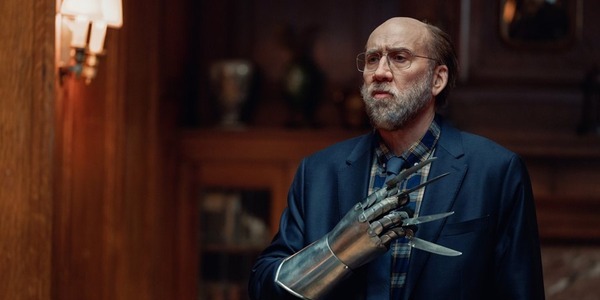DREAM SCENARIO: Fame Is A Nightmare

Payton McCarty-Simas is a freelance writer and artist based in…
“You’ve been on my mind a lot lately,” an old flame tells painfully nondescript, balding biology professor Paul Matthews (Nicolas Cage) when they bump into each other by chance one evening after a play. As it turns out, Paul Matthews has been on a lot of people’s minds in Dream Scenario, the latest from Sick of Myself director Kristoffer Borgli. This otherwise irrelevant man, whose insecurities have left him in a state of constant, subdued panic at his own personal and professional stasis, has somehow become an odd sort of viral sensation: He’s appearing in people’s dreams.
An investigation of fame, virality, and public visibility in general, Dream Scenario deftly balances the mundane, the surreal, and the blisteringly unpleasant with a comforting visual palette of suburban sidewalks in autumn, quiet classrooms, and warmly lit dinner parties shot beautifully by Benjamin Loeb (After Yang, Mandy). Paul’s well-ordered life may not be exciting, but it works for him. He gives the same lectures to new crops of students every year: Zebras’ stripes may not make good camouflage on their own, he tells them, but they help the herd blend together, making them into one entity. He’s been thinking about writing the same book since graduate school, too, a tome on ant colonies and the concept of the hive mind.

Not exactly subtle metaphors for the story of a man who fits in too well suddenly finding himself at the mercy of the tempestuous manifestation of our collective unconscious that is celebrity culture (my personal favorite line of cheekily on-the-nose dialogue: “Carl Jung was right!”)–– but the film adroitly harnesses this directness to skewer the blunt tool that is fame. One minute, through no fault of his own, boring old Paul is on top of the world; the next, not so much. Like the zebra separated from its herd, we are told again and again, sticking his neck out makes him “extremely vulnerable.”
Nicolas Cage: Dream Master
Dream Scenario makes good use of Cage, whose own cult persona inevitably inflects all of his projects, but who’s proven himself a master of celebrity self-fabulation to the point of starring in a movie about it (no, not this one, the other one). Here, unlike some of his more infamous roles, he is allowed to show his true range, revealing the depths of Paul’s neuroses slowly, characterizing him through small gestures and nervous, rictus tics like cracks in a rhinoceros’ skin, before getting really weird. Once the kids start calling him Freddy Krueger, those flickers of anxiety-fueled rage and frustration blossom hideously, warping this amicable nobody into a wild, disruptive force.
The dream scenes themselves allow him to run through countless bizarre, elevated, occasionally graphic situations, but his performance remains consciously modulated, as if to remind us that though he, like Paul, will (literally) wear Freddy Krueger’s glove if it serves him, his interests also lie with the more “serious” elements of his craft (or in Paul’s case, his book on ant behavior). In other words, fans looking for “Full Cage” moments should look elsewhere–– this film is doing something else with Cage‘s (dare I say “massive”?) talents.

That’s not to say the film doesn’t go off in strange directions. No Ari Aster-produced Nicolas Cage vehicle with the A24 imprimatur would be complete without rambling commentary on the fragile, self-loathing nature of the male psyche, a Charlie Kaufmanesque oneiric (meta)narrative structure, and at least three stoner-friendly visual jokes about magic mushrooms. In many ways, this movie could readily be seen as Beau is Afraid in miniature (the pathologically hapless Paul, like Beau, is beaten up by strangers, terrified of women, and ultimately hounded by a world that no longer makes any sense). Indeed, on this score, it’s highly successful. Paul’s agonized stabs at capitalizing on his newfound success at school, at his new agency, and, particularly, with women are masterfully stilted, staged for maximal knife-twisting. One scene involving a young ad agent, Molly (Dylan Gelula), is particularly queasy fun.
Conclusion
At the same time, thematically, Dream Scenario perhaps poses more questions than it is able to effectively answer. Once Paul’s luck begins to turn, much time is spent on jokes about “cancel culture.” While this back stretch of the film is just as successful as the first comedically, its satire becomes less well-considered: Woody Allen/Roman Polanski jokes don’t land quite as well when Paul has quite literally done nothing to deserve his cancellation, leaving a slight sense of “#MeToo has gone too far”-ism. Similarly, a section on dream advertising and “dreamfluencers,” though undeniably amusing, doesn’t have the time or space to fully land. With its anchoring narrative unraveled, then, the back portion of the film lacks some of the propulsion of what came before. Nevertheless, Dream Scenario maintains its pitch-black cringe comedy almost in spite of itself. Though the film, like Paul’s titular book, may be of less substance than its creators perhaps believe it to be, the French title Paul’s publisher didn’t bother to proofread, Je suis ton cauchemar (“I Am Your Nightmare”) is hilariously apt.
Does content like this matter to you?
Become a Member and support film journalism. Unlock access to all of Film Inquiry`s great articles. Join a community of like-minded readers who are passionate about cinema - get access to our private members Network, give back to independent filmmakers, and more.
Payton McCarty-Simas is a freelance writer and artist based in New York City. They grew up in Massachusetts devouring Stephen King novels, Edgar Allan Poe stories, and Scooby Doo on VHS. Payton holds a masters degree in film and media studies from Columbia University and her work focuses on horror film, psychedelia, and the occult in particular. Their first book, One Step Short of Crazy: National Treasure and the Landscape of American Conspiracy Culture, is due for release in November.













